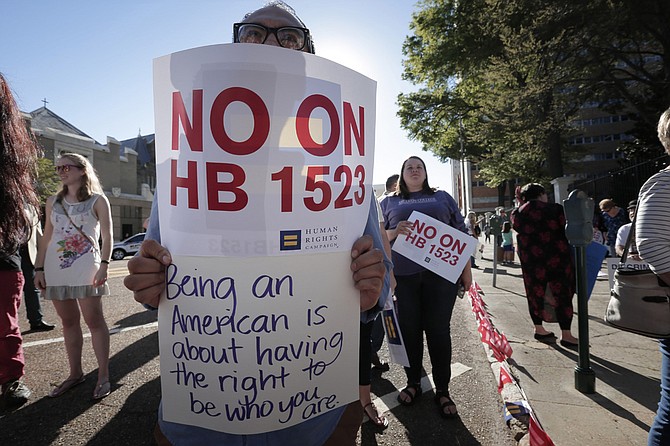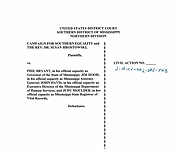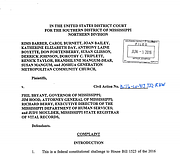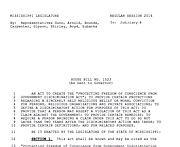Protesters rallied against House Bill 1523 in April, which will become law on July 1 unless U.S. District Judge Carlton Reeves blocks it this week. Photo by Imani Khayyam.
JACKSON — "Congress shall make no law respecting an establishment of religion or prohibiting the free exercise thereof...." How those words affect the language in House Bill 1523 could lead to a historic Establishment Clause ruling this week when U.S. District Judge Carlton Reeves decides whether or not to issue a preliminary injunction to keep HB 1523 from becoming law on July 1.
Pastors, priests, advocates and other Mississippians named as plaintiffs in two lawsuits that challenge the constitutionality of the bill claim that it advances a certain religious view, discriminates by favoring three particular beliefs and favors religion over non-religion, specifically targeting LGBT citizens.
Lawyers from the attorney general's office represented the defendants in the case: the governor, attorney general and Judy Moulder, the state registrar for vital records. They argued that the U.S. Supreme Court and U.S. 5th Circuit Court of Appeals predicted bills like HB 1523 that would "protect" those who oppose same-sex marriage in a post-Obergefell world, a case mandating that same-sex marriages are afforded the same protection as opposite-sex marriages.
Arguments spread over two days and 12 hours, with testimony from eight witnesses last Thursday and Friday.
'Reverse Discrimination'?
New York-based attorney Roberta Kaplan, who successfully challenged Mississippi's ban on same-sex marriage and adoption in previous federal cases, as well as United States v. Windsor, which struck down the Defense of Marriage Act defining marriage between one man and one woman, teamed up with Jackson-based attorney Robert McDuff, who both filed separate lawsuits in order to get a preliminary injunction before July 1.
Both lawsuits allege that HB 1523 violates the Establishment Clause of the First Amendment because it favors three particular religious beliefs over others. Kaplan called six witnesses to the stand, focusing on Section 2 of HB 1523, asking her witnesses to read the bill's sincerely held religious beliefs that: marriage should be recognized between one man and one woman, sexual relations are reserved to that marriage and that gender is assigned at birth.
Kaplan worked to prove that the bill had a religious intent, calling in Dr. Douglas NeJaime from the Williams Institute at UCLA School of Law, who testified about the history of religious accommodation bills. NeJaime said those types of bills began to crop up in the 1960s and even by 1993 when the U.S. Congress passed its own Religious Freedom Restoration Act, both groups from the religious right and from the left (like the ACLU) supported it because it covered all religious groups broadly.
NeJaime told the court that support for RFRA bills has shifted in the past five years, however. Now the religious right pushes them almost exclusively.
After the Obergefell decision, NeJaime said state legislators across the U.S. introduced more than 100 religious-exemptions bills. In 2016, only two passed: Mississippi's HB 1523 and Florida's "Pastor Protection Act."
The difference between the two, NeJaime said, is in scope. He called HB 1523 both "narrower and broader" than other laws and said it was an "outlier." While on the stand, NeJaime read a press release from Citizen Link, the public-policy arm of Focus on the Family now called the Family Policy Alliance, a conservative organization opposed to LGBT rights, that thanks the Alliance Defending Freedom for drafting the model legislation for House Bill 1523.
"Is that model legislation public record?" Judge Reeves asked NeJaime.
NeJaime said that while some proof of the conservative litigation group's legislative influence is available from past lawsuits, specific draft legislation for 1523 is not available.
Tommy Goodwin, an attorney from the attorney general's office defending Gov. Phil Bryant in the case, asked NeJaime to read parts of the legislative debate transcript that plaintiffs used as evidence. Goodwin had the professor read Sen. Jenifer Branning's, R-Philadelphia, comment on the Senate floor about HB 1523 "leveling the playing field" after Obergefell.
"The intent of the bill is to 'level the playing field'; is that correct?" Goodwin asked NeJaime.
"Yes."
McDuff went after that idea on Friday when both parties presented their arguments on the merits of the case. He called the notion of "reverse discrimination" absurd, citing the defendants' brief that says the Obergefell ruling tilted the playing field in favor of the LGBT community.
"What is reverse discrimination?" he asked. "Is there any way we straight people are being discriminated against?"
Tilting the playing field, he said, was unnecessary and did not make sense.
"That's like saying Brown v. Board tilted the playing field to white supremacists," he told the court. Later, he said, "House Bill 1523 is a giant hoax; it is a solution in search of a problem that doesn't exist."
Judge Reeves asked the defendants' attorneys if anything in HB 1523 protects a person who opposes opposite-sex marriage. Paul Barnes from the attorney general's office, said he had not considered that.
"Based on the text of the act, I'd say no," Barnes told the court.
Reeves also asked Barnes if he felt that those who supported the bill believed that their opposite-sex marriages were threatened by Obergefell. Barnes said yes, particularly those who hold those beliefs "disfavored" in Obergefell.
Not 'My Little Girl'
Plaintiffs called a host of witnesses, but at the end of Thursday's hearing, Kaplan called up Joce Pritchett, one of the original plaintiffs in the first Campaign for Southern Equality case, referred to as "CSE I" now, that legalized same-sex marriage in the state.
Pritchett told her story of coming out to her counselor and herself while she was married to a man she eventually divorced and about how difficult it was to be gay and live in Mississippi. Pritchett said she and her wife, Carla Webb, were terrified to be plaintiffs in CSE I, but attributed their willingness to her daughter, who came home from school one day and asked Webb and Pritchett why they weren't married.
The couple went and got married in Maine in 2013, after some states adopted same-sex marriage following the Windsor Supreme Court ruling.
Pritchett told the story of a couple she and Carla met recently whose little girl went to a different school than their daughter. Pritchett said the teacher singled out the little girl because of her parents' same-sex marriage.
"The teacher told the kid her parents' marriage wasn't legitimate," Pritchett told the court.
Then the teacher purportedly polled the class and asked which kids have one mom and one dad. The whole class raised their hands, ostracizing the little girl even more, Pritchett said.
"They're terrified of being public," Pritchett said of the little girl's family. The couple, she said, did not want to join the lawsuit for fear of putting a target on their little girl's or family's back. Kaplan asked Pritchett where she will be in a year's time, god-willing.
"Tampa, Florida," she said.
Pritchett and her family are moving to Florida, she said because, HB 1523 is the last straw.
"I don't want that to happen to my little girl," Pritchett said.
After an emotional testimony, the State did not question Pritchett at all, and court adjourned for the day.
'Elected Officials May Disagree'
Defendants argued that plaintiffs' attorneys presented no evidence of irreparable or immediate harm to plaintiffs to justify blocking the bill from becoming law. In their merits arguments, the attorneys cited parts of the Obergefell ruling that acknowledged "many good and decent people oppose same-sex marriage."
"There is no evidence that anyone has been denied a marriage license," Barnes told the court.
Defendants also reiterated that nothing in House Bill 1523 purports to immunize federal law from taking effect, saying that the state law does not attempt to circumvent federal law or provide protection exceeding what federal law can provide.
Kaplan, however, told Judge Reeves that the case was an "easy one" because HB 1523 "is exactly the kind of statute the (Establishment) clause was meant to prevent."
She reiterated that in past U.S. Supreme Court cases where the Establishment Clause is in question, the court can and should consider context and history surrounding the circumstances. In this case, she said, the court could take the history of religious accommodations laws and legislative debate into consideration.
Other Establishment Clause cases challenge prayer in public schools or crosses on state seals, and Kaplan said that if a person had standing to challenge a cross in a seal, then certainly her clients who would "metaphorically see HB 1523 every day of their lives" certainly had standing. There are few cases that have set precedent for an Establishment Clause case like HB 1523 has.
"No state in the country has had the chutzpah to pass a statute outlining three religious beliefs," she said. "No one has ever tried this before."
The state agreed that the situation for the case was rare, but instead compared it to the time in U.S. history when states legislated responses to the historic Roe v. Wade U.S. Supreme Court ruling.
Judge Reeves ruled in the "CSE I" case on Monday, re-opening it for the purpose of modifying the preliminary injunction and blocking the part of HB 1523 that pertains to circuit clerks. Reeves' order says that circuit clerks in the state must follow the precedent Obergefell set: issuing marriage licenses to same-sex couples the same as they do for opposite-sex couples.
"Mississippi's elected officials may disagree with Obergefell, of course, and may express that disagreement as they see fit—by advocating for a constitutional amendment to overturn the decision, for example," Reeves wrote.
"But the marriage license issue will not be adjudicated anew after every legislative session."
Update: Judge Reeves has blocked the part of HB 1523 that relates to circuit clerks. Read more about it here.
Editor's Note: This story went to press on Tuesday. For the up-to-date court rulings on House Bill 1523, please check jfp.ms/lgbt, and follow Arielle Dreher on Twitter at @arielle_amara for updates on the case.
More like this story
- UPDATED: ADF to Defend Bryant in HB 1523 Appeal, Emails Reveal Outside Groups' Influence
- HB 1523 Opponents Fight Back, Say Law Gives 'Special Rights'
- U.S. District Judge Carlton Reeves Blocks HB 1523
- Federal Judge Revives Same-Sex Marriage Case After 5th Circuit's HB 1523 Hearing Denial
- UPDATED: 'Still in Legal Limbo': HB 1523 Down in Mississippi, But Not Out






Comments
Use the comment form below to begin a discussion about this content.